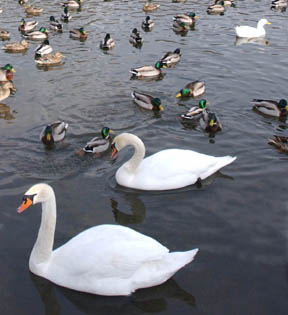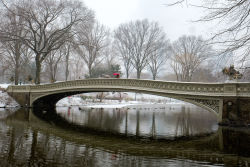Central Park
The Daily Plant : Friday, April 18, 2003
SWAN SONG

A pair of swans that lived on the Lake in Central Park since the early nineties passed away this week. The pair was beloved by many New Yorkers. Although the exact circumstances and dates of their deaths are unknown, it is common for swans to die in pairs. Swans mate for life, and so if one becomes sick and dies, the other often becomes sick as well, unable to function without its mate. The pair that lived in Central Park settled there naturally, and so it is likely that a new pair of swans will soon settle on the Lake, perhaps the offspring of the original pair, following in their parents’ footsteps.
The life cycle of a swan is often seen as an accelerated version of the human life cycle. Swans do not become fully grown until age two and although they may pair up as they enter adulthood, they delay breeding until their third, fourth, and even fifth year. Both male and female swans care for the young, even sharing incubation duties. Swans also migrate together as family units or in small flocks comprised of several families and some non-breeders. Hans Christian Anderson immortalized the similarity between swans and humans in his children’s story, "The Ugly Duckling," drawing comparisons between the swan’s long period of development and human adolescence. Excerpted below are two verses from Sarah Morgan Bryan Piatt’s poem, The Watch of a Swan, which dramatizes the grief of a swan after her mate dies.
I read somewhere that a swan, snow-white,
In the sun all day, in the moon all night,
Alone by a little grave would sit
Waiting, and watching it.
Up out of the lake her mate would rise,
And call her down with his piteous cries
Into the waters still and dim:--
With cries she would answer him.
We will miss these well known Central Park swans—the Lake is not the same without them.
QUOTATION FOR THE DAY
"Genuine poetry can communicate before it is understood."
TS Eliot
(1888-1965)
Check out your park's Vital Signs
Clean & Safe
Green & Resilient
Empowered & Engaged Users
Share your feedback or learn more about how this park is part of a
Vital Park System
Contacts
Central Park Information: (212) 310-6600
Central Park Information (for the Hearing Impaired): (800) 281-5722
Belvedere Castle, The Henry Luce Nature Observatory: (212) 772-0210
The Charles A. Dana Discovery Center: (212) 860-1370
The Dairy Visitor Center and Gift Shop: (212) 794-6564
North Meadow Recreation Center: (212) 348-4867
Loeb Boathouse (Bike rentals, boat rentals & gondolas): (212) 517-2233
Carousel: (212) 879-0244
Fishing at Harlem Meer (Catch & Release): (212) 860-1370
Harlem Meer Performance Festival: (212) 860-1370
Horseback Riding - Claremont Stables: (212) 724-5100
Metropolitan Opera (Performances on the Great Lawn): (212) 362-6000
New York Philharmonic (Performances on the Great Lawn): (212) 875-5709
Shakespeare in the Park - The Public Theater at the Delacorte Theater: (212) 539-8655
Central Park SummerStage: (212) 360-2777
Swedish Cottage Marionette Theater: (212) 988-9093
Tennis: (212) 280-0205
Weddings, Ceremonies and Photography at the Conservatory Garden: (212) 360-2766
Wildlife Center & Tisch Children's Zoo: (212) 439-6500











